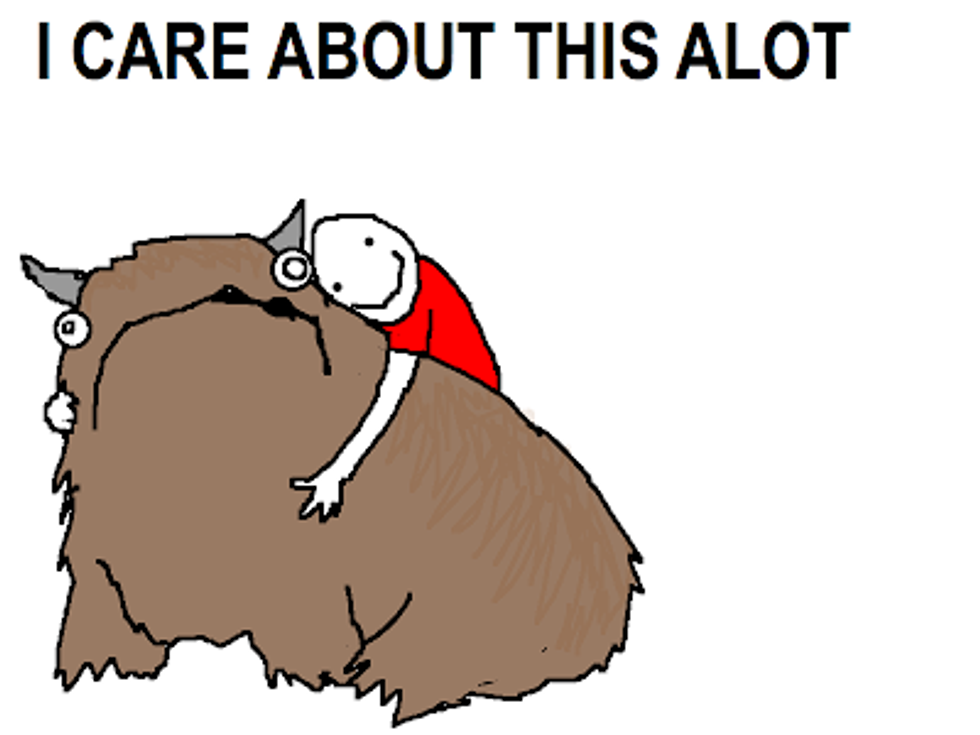As a copy-editor for my school newspaper, I come across some pretty egregious grammar mistakes made by excellent writers—mistakes that they do not even know they are making! Grammar isn’t always easy, and it’s something every person, whether they be a famous author or just a student writing a paper, should pay attention to because the accuracy of your writing is key to the way people view the ideas you have to offer (including whether they take you seriously or not). Believe it or not, that comma splice on your cover letter might be the one thing that separates you from your dream job.
“What is a comma splice?” You may ask. Well, you’ll just have to read to find out.
Let’s start out with the basics. Those damn homophones.
You’re not a plebeian, and of course you know your homophones—at least you think you do! The difference between “there”, “they’re” and “their” has not haunted you since 2nd grade, so you think you are a grammar pro, but there is more to homophones than meets the eye.
1. “Then” and “than”
You know there’s a difference between “then” and “than”, but what is it? Is it even worth the effort to figure out?
The difference is quite simple:
“Then” indicates some kind of sequence. Think “ThE(ffect)n”
“Than” indicate a comparison. It helps for me to emphasized the “a” sound in my head — for some reason it makes it more obvious to me that I am using “than” to compare two things.
2. “Affect” and “effect”
Although these words can seem pretty easy to differentiate in principle, they can get tricky in practice.
To review:
“Affect” is a verb which means to influence
“Effect” is a noun which means something is influenced.
Since they both mean just about the same thing, and the only difference is their role in a sentence, it can get a little confusing. You have to remind yourself how to recognize whether you need a noun or a verb in your sentence.
I do thing by seeing if I can put an article like “the” in front of the word I need. If so, I must use “effect”. A good way to remember this is “thE Effect”.
3. A lot
This is a simple concept that many people cannot grasp for some reason, so I will repeat it acouple times.
“Alot” is not a word.
“Alot” is not a word.
“Alot” is not a word.
The phrase you are looking for is “a lot”, and the next time you feel compelled to say “alot” instead, think of this adorable fuzzy friend, the Alot.
Ah yes, the dreaded comma splice. If you are a repeat offender of this grammatical sin, you’ve probably had many an English teacher call you out for it, but you just have no idea what they’re talking about.
A comma splice happens when you have two independent clauses (basically functioning individual sentences), but all you do to join them is add a comma which makes your sentence a run-on.
How do you fix this?
Add a coordinating conjunction!
You may know them as FANBOYS, and they are the glue that holds your sentences together.
For
And
Nor
But
Or
Yet
So
Remember them. Love them. They will save your sentences. Trust me.
5. “Definitely” and “Defiantly”
I don’t know if it’s a typo or a misunderstanding of the way words work in the English language, but “definitely” and “defiantly” are two very different words, and this mix-up is something that really grinds this copy-editor’s gears.
Definitely: an adverb that describes something than is certain.
Ex] “I am definitely going to the party.”
Defiantly: also an adverb, but it describes an action that is done obstinately.
Ex] “Even though he was banned from school, he walked into the building defiantly.”
These two words start and end similarly, but that is where their similarities end. Please do not confuse them.
Are there more grammatical mistakes that you are making? Of course!
Did I make a grammatical mistake in this article? Probably. No one is perfect.
What are your grammar pet peeves? Let me know in the comments.




















